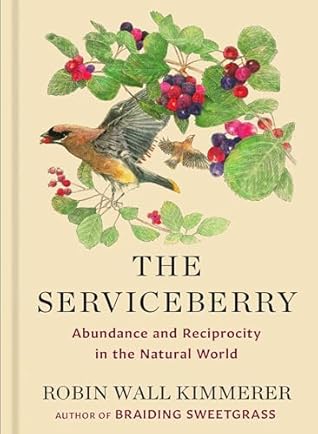More on this book
Community
Kindle Notes & Highlights
Read between
November 1 - November 1, 2025
Ecopsychologists have shown that the practice of gratitude puts brakes on hyperconsumption. The relationships nurtured by gift thinking diminish our sense of scarcity and want. In that climate of sufficiency, our hunger for more abates and we take only what we need, in respect for the generosity of the giver.
“Ecopsychologists have shown that the practice of gratitude puts brakes on hyperconsumption. The relationships nurtured by gift thinking diminish our sense of scarcity and want. In that climate of sufficiency, our hunger for more abates and we take only what we need, in respect for the generosity of the giver.”
Truth
Gratitude and reciprocity are the currency of a gift economy, and they have the remarkable property of multiplying with every exchange, their energy concentrating as they pass from hand to hand, a truly renewable resource.
Energy, however, is a very different story. While chemical materials can cycle in an ecosystem, energy flows in one inevitable direction. Even though it can be temporarily stored, it always moves on, thanks to the laws of thermodynamics.
When an economic system actively destroys what we love, isn’t it time for a different system?
Why then have we permitted the dominance of economic systems that commoditize everything? That create scarcity instead of abundance, that promote accumulation rather than sharing? We’ve surrendered our values to an economic system that actively harms what we love.
students learn is that economics is about decision making in the face of scarcity. Anything and everything in a market is implicitly defined as scarce. With scarcity as the main principle, the mindset that follows is based on commodification of goods and services.
“students learn is that economics is about decision making in the face of scarcity. Anything and everything in a market is implicitly defined as scarce. With scarcity as the main principle, the mindset that follows is based on commodification of goods and services.”
And this is why I hated ECON classes.
Ecological economics is a growing field that integrates Earth’s natural systems and human values and ethics into conventional economic theory. Valerie prefers to define economics as “how we organize ourselves to sustain life and enhance its quality. It’s a way of considering how we provide for ourselves.” I like that better.
In a gift economy, wealth is understood as having enough to share, and the practice for dealing with abundance is to give it away. In fact, status is determined not by how much one accumulates, but by how much one gives away. The currency in a gift economy is relationship, which is expressed as gratitude, as interdependence and the ongoing cycles of reciprocity. A gift economy nurtures the community bonds that enhance mutual well-being; the economic unit is “we” rather than “I,” as all flourishing is mutual.
When human survival is threatened, compassionate acts overrule market economies.
“one of the assumptions of modern economic theory is that we will each behave in conformity to Adam Smith’s “Rational Economic Man,” characterized as a greedy, isolated individual acting purely in self-interest to maximize return on investment. The system is designed to support this hypothetical caricature and seems therefore to produce them.”
Again, ECON was the worst.
Know the ways of the ones who take care of you, so that you can take care of them. Introduce yourself. Be accountable as the one who comes asking for a life. Ask permission before taking. Abide by the answer. Never take the first one. Never take the last. Take only what you need. Take only that which is given. Never take more than half. Leave some for others. Harvest in a way that minimizes harm. Use it respectfully. Never waste what you have taken. Share. Give thanks for what you have been given. Give a gift in reciprocity for what you have taken. Sustain the ones who sustain you and the
...more
Honorable Harvest:
“Know the ways of the ones who take care of you, so that you can take care of them.
Introduce yourself.
Be accountable as the one who comes asking for a life.
Ask permission before taking. Abide by the answer.
Never take the first one. Never take the last.
Take only what you need.
Take only that which is given.
Never take more than half. Leave some for others.
Harvest in a way that minimizes harm.
Use it respectfully. Never waste what you have taken.
Share.
Give thanks for what you have been given.
Give a gift in reciprocity for what you have taken.
Sustain the ones who sustain you and the Earth will last forever.”
Let’s remember that the “System” is led by individuals, by a relatively small number of people, who have names, with more money than God and certainly less compassion.
I’ve never quite understood something about human economics, and that is the primacy of scarcity as an organizing principle.
It is manufactured scarcity that I cannot accept. In order for capitalist market economies to function, there must be scarcity, and the system is designed to create scarcity where it does not actually exist.
market economics demands that abundant, freely available, earthly gifts be converted to commodities and made scarce by privatization and high prices.
An economy based on the impossibility of ever expanding growth leads us into nightmare scenarios.


